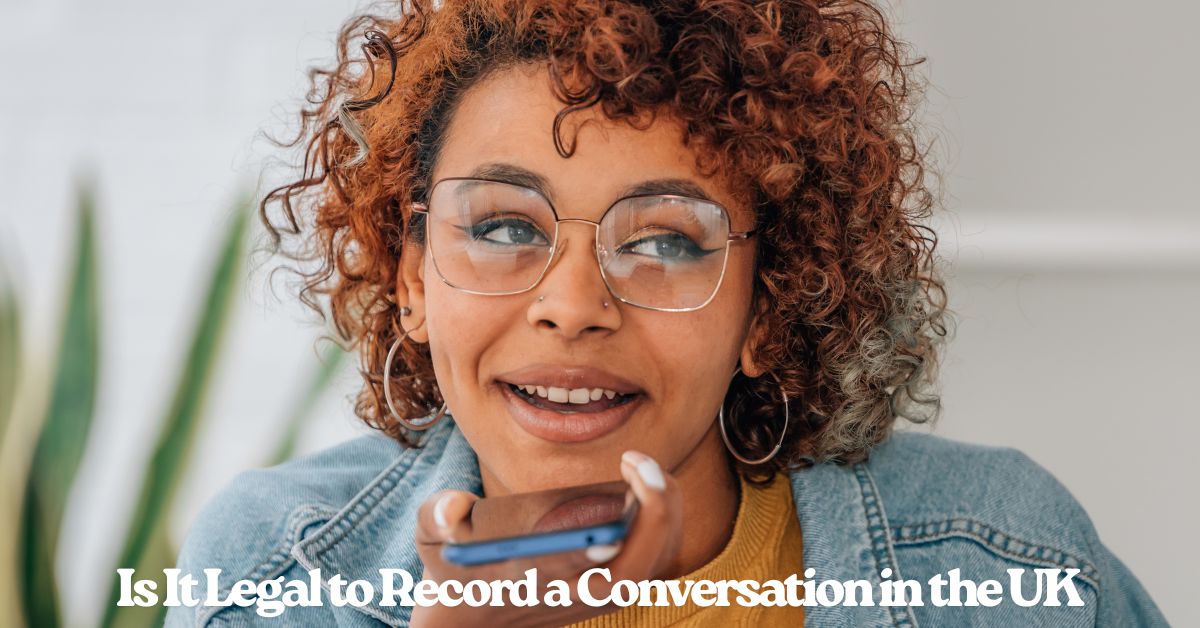Understanding the Legal Framework
In an age of smartphones and Zoom calls, recording conversations has never been easier—or more legally complicated. If you’ve ever wondered, “Is it legal to record a conversation UK?”, you’re not alone. The legality of call recording in the UK hinges on who is doing the recording, why, and how the content is used. Under the Regulation of Investigatory Powers Act 2000, individuals may record a conversation they are part of, without notifying others, provided the recording is kept for personal use and not shared with third parties. Sharing or using it in business or legal contexts, however, may trigger legal scrutiny under the Data Protection Act 2018, UK GDPR, and General Data Protection Regulation (GDPR).
Business Use vs. Personal Use
For personal purposes, recordings are typically lawful, but business use introduces significant legal risks. Companies are bound by data protection laws to obtain consent, have a lawful basis, and disclose why the recording is necessary. For example, the Financial Conduct Authority (FCA) mandates that firms in the finance sector retain customer service calls for a minimum 12-month retention period. Failing to obtain consent to record a phone call or meeting in a business setting may result in a breach of trust, employee dissatisfaction, or even unfair dismissal claims under employment law.
Data Protection and Compliance Obligations
Since the 2016 introduction of the GDPR, businesses are legally required to follow the 7 principles of data protection, which include secure storage, data minimization, encryption, transparency, and accountability. Audio and video recordings count as personal data under UK GDPR, making it necessary to inform individuals before pressing record. Companies should align practices with their Privacy Policies and use formal Data Processing Agreements when storing or handling recordings involving third parties.
Legal Pitfalls of Covert Recordings
Covert recording—whether with recording devices in meetings or via Zoom/Teams—is not outright illegal but is often frowned upon. In the workplace, such actions fall under workplace surveillance UK and must adhere to data protection compliance standards. Secret recordings risk violating privacy rights under Article 8 of the Human Rights Act 1998 (ECHR) and may prompt investigations by the Information Commissioner’s Office (ICO) or the Data Protection Commissioner, especially if a data leak or improper data storage occurs.
You might also like: Slash Inheritance Tax After Losing Parents
Covert Recording and the Courts
Using covert audio evidence in legal proceedings is possible but requires caution. In tribunals or court, submission often involves a C2 Form, and even then, tribunal evidence is only accepted under limited circumstances. Under Section 13(4) of the Children and Families Act 2014, recordings involving children are nearly always inadmissible. Even when admitted, the method of obtaining such evidence can reduce its impact and harm the credibility of the party submitting it.
Ethical and Reputational Considerations
Even when the law permits recording, ethical risks remain. Covert actions may erode employee trust, damage workplace culture, or undermine open dialogue. Ethical call recording means full transparency, obtaining consent, and laying out a clear workplace policy—ideally outlined in a staff handbook. Employers should focus on communication and fairness over secrecy.
Best Practices for Legal & Ethical Recording
To stay compliant and maintain a respectful environment:
- Be transparent with staff and clients.
- Include a call recording policy UK in your staff handbook.
- Use encryption and ensure secure storage.
- Set data retention period limits and delete outdated recordings.
- Train managers and staff on GDPR rules for businesses.
- Avoid recording without consent unless legally justified.
Conclusion
So, is it legal to record a conversation in the UK? The answer depends on context, consent, and purpose. Personal use is generally lawful under the Regulation of Investigatory Powers Act 2000, but business use requires strict compliance with UK GDPR, employment law, and the Human Rights Act 1998. Transparency and legal understanding should always guide your approach. If in doubt, seek professional advice and always inform participants before recording.
FAQs
Can I record a conversation without consent in the UK?
Yes, but only for personal use and if you are part of the conversation. Sharing the recording or using it for business purposes without consent is typically illegal.
Are covert recordings legal in the workplace?
They are not necessarily illegal but carry serious ethical and legal risks. Businesses must comply with data protection laws and notify individuals being recorded.
Can covert recordings be used as court evidence?
Sometimes. Courts and tribunals may accept covert recordings if the information is vital and lawfully obtained, but their use can also be damaging to the submitter’s case.
How long should call recordings be stored?
The FCA mandates a minimum of 12 months for certain financial recordings. Other businesses should follow their internal data retention policies.
What is a C2 Form?
It is a formal application used to submit evidence (like recordings) in court.
What should a call recording policy include?
It should cover consent, lawful basis, monitoring, data storage, encryption, and references to Privacy Policies and Data Processing Agreements.
What are the consequences of recording without informing someone?
Possible consequences include fines from the ICO, employment tribunal claims, reputational damage, and even legal liability for breach of privacy laws.
Are Zoom and Teams calls treated the same as phone calls?
Yes. If you record Zoom or Teams meetings, the same rules on consent and data protection apply as with any other form of audio or video recording.
Who enforces these rules?
The Information Commissioner’s Office (ICO), Data Protection Commissioner, and the UK legal system (including tribunals and courts) enforce data protection compliance laws in the UK.

